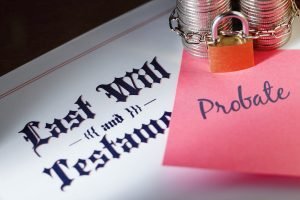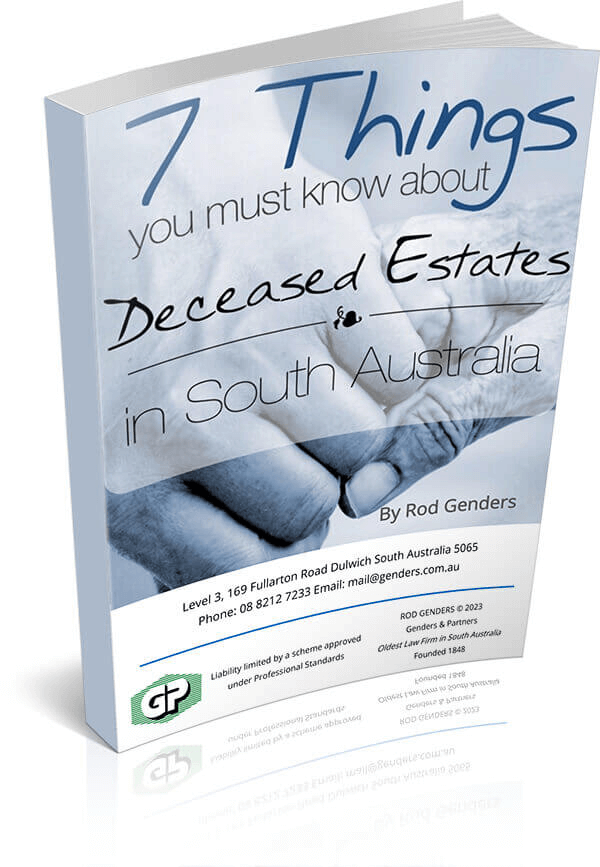
If you’ve been named the executor of a Will, you might experience a wide range of emotions upon your loved one’s passing. In addition to going through the grieving process, you might feel overwhelmed by your responsibilities in carrying out the deceased’s wishes.
You may have even heard horror stories about probate that leave you wondering where to begin, but you can relax knowing that your specialist estate lawyer at Genders & Partners can help you navigate any obstacles you face regarding probate & deceased estates in Adelaide.
Who Owns a Dead Body?
This was the question asked in a 1996 English Court case where relatives sued a hospital for failing to retain the deceased’s brain after his death f or forensic purposes. The Court held that no one owns a dead body. It is not an asset that can be owned. In death, as in life, there is no right of private property in a human corpse.
The thornier questions are: who “controls” the dead body and what rights do family members have over the body? Even if there is no legal ownership certain people have the right to possess the body as a result of their duty to dispose of the body. If the body is lying on hospital premises, the hospital authorities will be in lawful possession of the body. If the Coroner has jurisdiction (the power to hold an inquest) he has the right to possession of the body for the purposes of his enquiries. This same authority is sufficient to permit the pathologist, as the Coroner’s agent, to have the legal right of possession until the Coroner’s inquiry has come to an end.
The way in which the body is put to rest is sometimes contentious between grieving family members. Conflicts can arise between people (typically the deceased’s parents and spouse) as they try to impose their respective interpretations of what should constitute the appropriate final tribute for the deceased. A parent’s view of their child often differs to how that child’s partner views them.
Remember the American case of Terry Schiavo? She lingered in a coma for 14 years, while her husband battled with her parents over the issue of whether life – support should be withdrawn. Historically, religious beliefs such as a bodily resurrection at Judgement Day and the construct of Purgatory have heavily influenced the concept of sanctity of human mortal remains.
In England, a Royal Proclamation in 1560 banned the desecration of some monuments and tombs. However because dead bodies were not legal property, sale of corpses from grave robbing was not illegal until the Anatomy Act 1832, when fresh dead bodies were in great demand by the medical profession for anatomy research – remember Burke & Hare?
In modern day Australia, the Executor of the estate of a deceased person is the legal personal representative, who has the legal right to make the funeral, burial and cremation arrangements – regardless of what other family members may wish. If there is no Will an administrator will be appointed by a Court for the same purpose. The person first entitled to a grant of administration of the estate will be entitled to possession of the body in order to determine how to dispose of it. This is usually the spouse, nearest relative or next of kin or, in the case of a child, the parents.
Sometimes a testator makes a written direction about disposing of his body in his Will. Realistically however, a reading of the Will is generally not made until after the funeral or cremation occurs. So while it is prudent for a written direction to be made in the Will, there should also be an open discussion about these final wishes. Additionally, pre – arranged funeral plans are an excellent idea.
It has been suggested that in Australia an Executor is not given rights in the estate until Probate is grant ed. However Probate is only required for certain types of property held by the deceased. Probate is not required to hold the funeral. A lack of Probate does not prevent the Executor from accepting the appointment. It does not prevent the Executor exercising powers that do not require Probate. Such powers are exercisable from the moment of death.
What Is Probate?
Probate is the legal process that proves the validity of the deceased’s last Will and grants the executor the authority to distribute the estate according to the terms of the Will. In some cases, such as when all accounts are held jointly with the surviving spouse, probate is not necessary. Otherwise, banks, the Lands Title Office and other institutions will need to see a grant of probate before they can work with the executor to close or transfer accounts.
What Issues May Arise With Probate?
While it is possible for you to complete a probate application on your own, it is not advised. Several core documents are generally needed for the application process. These include the executor’s oath, the original Will, an affidavit of assets and liabilities, a draft grant of probate and a registrar’s certificate. However, you may also need to complete complicated affidavits if any of the following is an issue:
- The Will’s validity is questioned
- The testamentary capacity of the deceased is in question
- It is not clear which Will is the last one
- It is a do-it-yourself Will that was not signed, dated or completed properly
- The Will contains errors, such as misspelled names and incorrect addresses
- The original Will is altered in any way, including handwritten notes or removed staples
Your Adelaide probate & deceased estates lawyer has faced every possible complication when it comes to probate and can handle each one with ease, performing all the necessary research and preparing documents meticulously to save you time and money during this overwhelming time.
Expert Wills & Estate Planning in Adelaide
Whether you need help with Wills & estate planning or face confusion over your duties as an executor, Genders & Partners is ready to offer you the guidance you need. To schedule a free consultation for probate & deceased estates in Adelaide, contact our law office today.
Weird Probate Issues Articles Series
- Weird Probate Issues
- More Weird Probate Issues
- Weird Probate Issues Part 3
- Weird Probate Issues Part 4
- Weird Probate Issues Part 5
- Weird Probate Issues Part 6
- Weird Probate Issues Part 7
- Weird Probate Issues Part 8
- Weird Probate Issues Part 9
- Weird Probate Issues Part 10
More Probate Resources
FREE REPORT “7 Things You Must Know About Probate and Estate Administration”

In this report you will Learn:
- What is Probate
- Duties of Executors
- Who Should Serve as Executor
- Executor’s Commissions
- Legal Fees and Expenses
- Sale of Real Estate and Other Property
- Challenges to the Will or Estate







